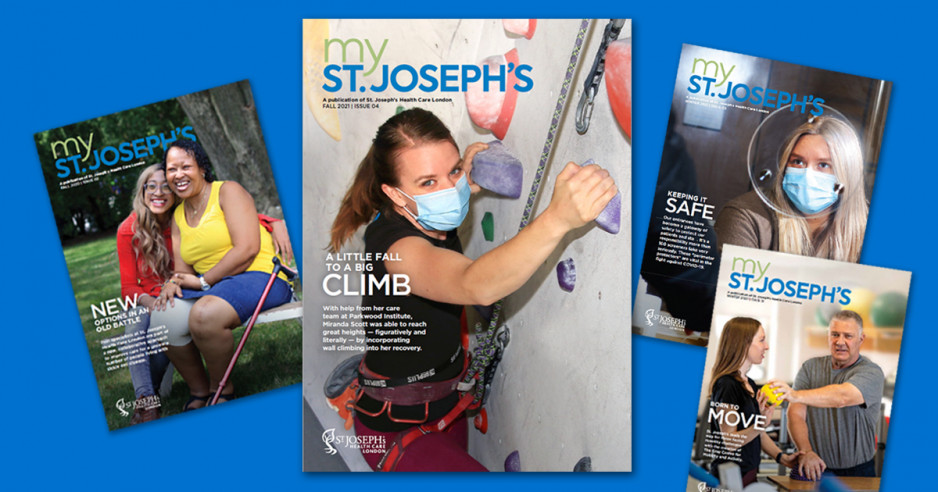Hope Beyond Hospital Walls
What started as a lofty goal to reduce suicides and attempted suicides within a health care setting is taking flight in communities across Ontario. A suicide prevention toolkit is generating hope well beyond hospital walls.
A leader in suicide prevention, St. Joseph’s Health Care London was the first organization in Canada to implement Zero Suicide, a patient safety initiative that strives for system-wide transformation by wrapping care around those at risk of suicide so that fewer people fall through gaps along their care journey.
Now, the framework is available to any community organization, large or small, via the Zero Suicide Community Implementation Toolkit. The toolkit has been specifically designed to support organizations that are not a formal part of the health care sector by providing them with tools to create their own suicide prevention initiative.
The Zero Suicide program at St. Joseph’s was shaped by those who have experienced a suicide attempt or suicidal thoughts – either personally or through a loved one – and individuals who have been affected by a loss due to a suicide death. Among them is Thomas Telfer (SJD), a professor in Western University’s Faculty of Law, who was a member of the Zero Suicide Implementation Committee when the program was first launched at St. Joseph’s.
“I am a survivor of two suicide attempts,” says Thomas. “That the hospital included someone with personal lived experience was really important.”
In 2016, St. Joseph’s began implementing the Zero Suicide initiative in phases within the Mental Health Care Program. Today, the framework is embedded within additional care areas across the organization. It includes processes to assess an individual’s suicide risk, helping them to stay safe, and providing evidence-based follow-up and treatment. The program’s implementation was funded entirely through donations to St. Joseph’s Health Care Foundation.
Through his role on the committee, Thomas shared experiences from his past hospitalizations, allowing him to provide a very important patient perspective. He was also involved in developing a ‘coping plan’ tool for patients. The tool helps patients identify, together with their care provider, types of situations that may cause stress and to determine healthy coping behaviours, as well as who they can connect with when support is needed. It’s a plan for wellness, focusing on the positive steps to stay healthy – both physically and mentally. In addition, patients at higher risk work with their care provider to develop a suicide management plan and receive extra support until they feel safe again.
Many of these resources are now part of the Zero Suicide Community Implementation Toolkit.
“Our goal is to decrease suicide rates within our region by providing organizations and their staff members with the tools they need to better identify, support and assist those who may be experiencing thoughts of suicide,” explains Shauna Graf, project lead for St. Joseph’s Zero Suicide initiative.
Created in collaboration with Niagara Region Public Health (NRPH), who have also implemented the Zero Suicide model within their organization, the toolkit includes the experiences and successes of both St. Joseph’s and NRPH.
Thomas considers the toolkit “an amazing accomplishment” that provides all organizations with a vital guide to help care for the psychological health and well-being of their employees.
“It’s really about improving the quality of life of people,” he explains. “The toolkit should be used as part of a larger conversation about mental health and to encourage open-dialogue, allowing people to be more open about their own personal thoughts, feelings and experiences so we can continue to break down the stigma that still surrounds mental illness and suicide awareness.”
As a registered nurse who has worked within the mental health field for eight years, Shauna feels the goal of zero suicide is indeed a community responsibility.
"We can all take part in suicide awareness and prevention," encourages Shauna. "From the way we individually think and talk about suicide to how we prioritize and commit to safer communities, action to prevent suicide is a collective responsibility. Working together to create and share resources are truly actions that generate ripples of hope."
To learn more about the Zero Suicide initiative or to request information on the Zero Suicide Community Implementation Toolkit.
For mental health crisis support in London-Middlesex:
- Contact Reach Out crisis response line- Call 519 433-2023 or 1-866-933-2023 (The crisis response line and web chat are both available 24/7 and confidential)
- Go to the Canadian Mental Health Association Crisis Centre, located at 648 Huron St, London, ON, 519 434-9191
- Go to your nearest emergency department
- Call 911

